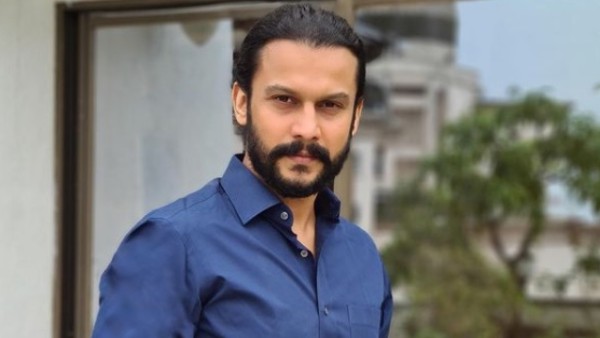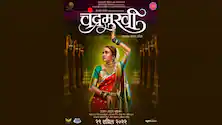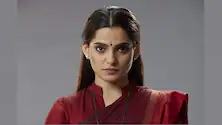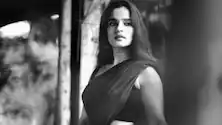EXCLUSIVE INTERVIEW! Adinath Kothare: Consistency In Delivering Quality Is What Makes You A Star
"We eat, drink and breath cinema. But in spite of that, we don't have a filmy atmosphere at home. That's how I was brought up too," Adinath Kothare tells me over the phone. Probably, that's one of the reasons why he has his feet firmly on the ground. Following the footsteps of his illustrious father (veteran Marathi star Mahesh Kothare), this young, dynamic actor has been conquering hearts with one project at a time.
As I converse with him, I discover a lesser known facet of his personality which is barely known to public. Beneath his famous demeanor lies a curious actor who believes more in the journey than the destination.

A well-known face in Marathi cinema, Adinath is currently basking in the success of his recently released political thriller web series City Of Dreams 2. He is also gearing up to enter an uncharted territory with his Hindi debut, Kabir Khan's sports drama '83.

In an exclusive tete-a-tete with Filmibeat, this heartthrob of Marathi film industry decodes an actor's process, shares his take on the changing face of Marathi cinema, the challenge of doing ensemble films, the trend of pan India films, '83 and much more.
Excerpts from the chat-

'When Someone Appreciates My Work, That's An Adrenaline Rush For Me'
Q. Congratulations Adinath for your amazing performance in City Of Dreams 2. One of my favourite scenes is the one where Poornima Gaikwad (Priya Bapat) pays a visit to your character Mahesh Aravale at his house post the debate. It is a moment where your character gets a reality check but at the same time, he also finds hope. What was your mind space like when you shot that scene?
A. It was definitely a difficult scene to shoot. I think it was in the first two days of my shooting schedule. Nagesh Sir (Nagesh Kukunoor) put me right into it which I think was the best strategy that worked for the character. I shot my most difficult scene of the entire season on the first day of shoot. It was that debate scene with Poornima Gaikwad on the stage. Because of this, I really jumped into the character and was able to find its 'sur' quickly. When you are dealing with complex emotions, you are answering a lot of questions that are coming in your head at that moment, which in turn helps you in finding the character faster. That really worked for me. It was all Nagesh Sir's magic and the way he communicated the scenes to me. He gives you amazing brief about the character and the scenes. At the same time, he gives you complete freedom to explore it. That's the beauty of working with a director like him. He understands the language of an actor.
Mahesh Aravale was a very difficult character to play especially in that scene that you pointed out. He is not an alcoholic. He's headstrong and a genuine aspiring politician. So that scene had to reflect his character. He is unhealed because of the disturbing past that he has been through. There is a dialogue where he asks Poornima, "Agar Gaikwad nahin bhejta toh nahi aati kya?" So, he is looking for any signs of closure in that scene and he finds it. He is feeling cheated and betrayed and wants to come out of it, and Poornima gives him a hand and pulls him out of that pit. I think every person finds his closure on his own and not because of anyone. It was a critical scene for that season.
Q. Not many people know that you are a graduate in biotechnology and hold a MBA degree in finance. In fact, you never planned to be an actor. But once you jumped into this creative field, you dabbled with different aspects of every medium (TV, films and web). What is that one thing about this field which gives an adrenaline rush and makes you want to hit to work daily?
A. When someone appreciates my work, that's an adrenaline rush for me and that's what I live for. You work really hard and put your sweat and blood into something as a producer, director or an actor. After seeing your work when people actually take out the effort to reach out to you and say, 'Boss, I love what you did," it adds fuel to that fire.

'Actors Who Can Create Magic Every Time On Screen Become Legends'
Q. When an actor begins his journey, initially the audience relates more to his character on screen than him. For example when you made your debut as a male lead with the Marathi film Ved Lavi Jeeva, people were not aware about you as an actor because they had never seen you on screen. But as you keep on doing films after films, the challenge becomes tougher because now, they know you as Adinath Kothare. They know your strength and weaknesses as an actor. How challenging does it get for you to come up with something new every time? How do you prepare yourself for this?
A. The journey has to be inside out and not the other way round. You need to do what inspires, challenges and excites you. You need to think of something that would make you want to get out of the bed and really head out there and make things happen. You need to search for that fire and keep it burning. You shouldn't worry about how you want others to think of you and then according to that, decide what to do. It should be an internal process. I have learnt this from my father (actor Mahesh Kothare). Even at this age, he is as passionate as he was at the prime of his career. That's something what he gave to me. That's what matters at the end of the day; your passions, your dreams and what you do to achieve them. That's what keeps you going. I think those efforts do get noticed one day by the audience. That's an old saying which is true, 'Karm kar phal ki asha mat kar.' You need to keep working hard and one day, you never know when that door will open. You need to be ready for that moment and for that, you need to keep working with the same passion and intensity every day and every time.
Q. I have come across a lot of actors who don't shy away from calling themselves insecure. Acting is an emotionally draining process. You may be having a bad day at home but once the camera rolls on the set, you have to be emotionally present there. How do you keep yourself focused? Every actor wants validation for his work. Does that make you insecure at any instance? Also, when you give your shot, do you ponder whether it's okay or not, or are you pretty confident about it?
A. There is insecurity in every profession. But yes, you need to be a little insecure and jealous. You look for appreciation from all the people on the set. You give a shot and when the director or the DOP praises you, it makes you feel nice. But then over a period of time with all the experience, you too realize whether you have done a good job or not. Since you want to give your best shot, you ask the director, 'Can I do one more?' Sometimes you get that one chance.
Acting is a meditative process. That's my take on it. For every art form, there's a meditative process. When an actor goes on the set, he has the script, the character sketch, dialogues and he has to be in that moment. Sometimes you watch a movie and you are like 'uff, that's magic.' Well, this magic doesn't happen every time. Actors who can create that magic every time become legends (laughs). That's why we have actors like Amitabh Bachchan, Naseeruddin Shah, Tom Hanks, Dilip Kumar. So what's that magic? Basically as an actor, you have to remember the lines, the character sketch, the emotions in that scene and the one prior to that, the backstory of the character. When the director says action and the camera rolls, you need to forget everything and be in that moment and let all those lines and emotions come to you subconsciously. You cannot pretend in front of the camera. It shows. You have to feel and emote that moment. Subconsciously when you do that scene and when those lines come naturally to you with those embedded emotions flowing out the right way, that's when magic happens. That's what every artist is striving for in life. Achieving that moment and symphony is also an adrenaline rush.

'Stars Like Salman Khan Depend On Good Script Now; Even He Needs A Bajrangi Bhaijaan And A Sultan'
Q. Gashmeer Mahajani in a recent interview spoke about how Marathi films have still not managed to break the regional barrier as compared to south films. Citing the reason behind the same, he said that while Marathi cinema has some great content, it has to be mixed with right doses of entertainment. He also mentioned that Marathi cinema needs to create heroes and this need not be gender specific. His definition of a hero was, 'Someone who is created by an intelligent director, scriptwriter or producer and has a certain following on the basis of which people will go and watch a film in theatres.' Do you echo a similar sentiment?
A. I think the language of cinema has changed now. Honestly, the audience doesn't look out for heroes. I think the real hero in today's era is the writer. The beauty of Marathi cinema is that it is very content-driven. It is not star-driven. The factor responsible for this is not the makers but the audience. That's what they want. They want to listen to genuine stories. By creating consistently great stories and content, Marathi cinema will be increasing its credibility which it is doing slowly. When this credibility increases with people all over the nation watching it, then they start looking out for heroes in that industry. They start looking out for a face that they might recognize the industry with.
Marathi industry had heroes when my father was working as an actor in the 90s. Until then, the industry was star and content driven. But then after that, the quality of content started deteriorating because of which the star value decreased. The star system vanished. Because of that, the industry had to bounce back again. When it bounced back, it happened in a very different way with films like Fandry, Sairat and Natrang. These were extremely content-driven films. I think it's an era that we are going through. Marathi cinema is evolving. The industry is again rising and is at its best right now. After 90s, it's coming again to its best form but it's going to take time. With consistent great content, one day, there will be great heroes. And this applies for every industry.
Even stars like Salman Khan depend on good script now. Even he needs a Bajrangi Bhaijaan and a Sultan. He just can't shake his belt nowadays and he is smart enough to have understood that. He has probably realized this and that's why you see some Salman Khan films with good content and message. The audience has matured now. Basically what has happened over a period of years is that the mystery of cinema is no longer there. With the advent of social media, the public has become very much aware and they know what their actors do. They know how films are made. Earlier, there was a mysterious aura which is not there now. In today's times, they look at the actors as their friends and next-door neighbours. Hence, what's more important in today's era is the content. The real heroes of today's times are the writer and filmmaker. That's what is happening. That's my take on it.
Q. I think the advantage that a hero may have is that he might get more number of chances. For example if an actor has a certain number of fan base and if his one film doesn't do well, the audience might still give him a second chance which might not be the case for a not so famous actor...
A. Yes but that happens when a particular actor gives successful films consistently. My father gave seven-eight silver jubilee films back to back and that's how he became a star. Amitabh Bachchan gave back-to-back hit films. Even Aamir Khan. I think consistency in delivering quality is what makes you a star. He may be an actor, writer or a director. It's not about creating a star; it's about creating good films which in turn, will create stars.
Q. Who is your harshest critic? Your father or your wife (actress Urmila Kothare) since both of them are a part of showbiz.
A. Both are equally harsh. To be honest, we are all harsh critics of each other.

'We Are Waiting For The Day When The Audience Will Appreciate Paani; That Would Be The Real Award'
Q. You recently turned director with Paani which was bankrolled by Priyanka Chopra. Do you believe a subject like this gets a better reach and becomes more commercially viable when you have a name like her attached to it?
A. Absolutely. Priyanka has achieved a great big deal and reached the place where she is. That's really commendable. She is an extremely inspiring personality and to have her as an international producer is a great boon for Indian content.
Q. The film bagged a National Award and you too won the Best Actor award at New York Indian Film Festival. It's a dream come true for anyone especially for a first time director. What was the feeling like?
A. It's surreal and amazing. Like I said before, appreciation is what we live for and that really burns the fire in you. Now, we are waiting for the film to release soon. I hope that theatres would open up now. Things are slowly reopening so we are waiting for that day when the audience will appreciate it. That would be the real award.

'Ranveer Singh Brings So Much Positivity And Warmth On The Sets'
Q. You will be soon stepping in the Hindi film industry with Kabir Khan's sports drama '83 which has an interesting ensemble star cast from different film industries. There's Ammy Virk and Harrdy Sandhu from north, Jeeva from South, you and Chirag Patil from Marathi cinema and so on. Every industry has its own cultural fabric in terms of story-telling. What was your biggest takeway when you interacted with them?
A. It was a surreal yet humbling experience. All these people are such big personalities in their fields and they are all so humble. It was amazing to work with Ranveer Singh, Kabir Khan. They are such great and grounded people. When we were working on sets, we all got along so well. They all were extremely easy to work with and talk to. Sometimes, there would be moments when I would just step back, take in the moment and realize that 'wow, I am in such a great company with amazing personalities.' They are great achievers. We are all friends now.
Q. Ranveer Singh is known to be a bundle of energy. How was it sharing screen space with him?
A. I think the energy that you see on screen is the same off screen as well. That's commendable. He is one of the most genuine people I have met. He brings so much positivity and warmth on the sets.
Q. You are essaying the role of Dilip Vengsarkar in '83. You know playing real life characters come with a great responsibility. When you were enacting that role, besides the research material and Kabir Khan's vision, did you also step in to share your creative inputs? I am sure you must have done your set of research as well..
A. Kabir Khan was extremely easy to work with. He was very open to discussions and all. He was very welcoming when we went up to him, asked and discussed things. But you know he had a very clear vision, and that's the best thing that an actor can get from a director. He knew what he wanted and that really helps you as an actor to deliver. After all, the director is like the captain, right? It was a treat to be guided by Kabir Sir. I got to learn a lot from him.
Q. When you do an ensemble film, every actor wants to give his best shot to make sure that it leaves a lasting impression on the audience especially when you have a film like '83 where every actor is a good performer. At the same time, you also need to collectively lift the film. What is tougher for you; doing an ensemble film like this or a solo movie where the focus is only on you?
A. I think ensemble films are tough to do (pauses)...I think both have their challenges. In an ensemble cast, the entire weight of the film is not on your shoulders; it's shared. In a way, it's a shared responsibility. When you have a great camaraderie and great team work happening, it's a beautiful experience. It's a cakewalk. When it's a solo film, the whole weight comes on your shoulder as an actor. You have a big responsibility. Hence, the risk is higher in a solo film as compared to an ensemble cast.
But I think when it comes to performances, in an ensemble setup we all have our moments in the film and when that moment arrives we have to make the best of it. An actor will always have that fire in him and when every actor thinks like that, that's when the fire becomes great. That spirit or fight is what makes the entire film a package. But I think that's challenging as well because you have to work as a team and a unit. At the same time, you have to do your homework well.
For me, I was working with such big actors like Ranveer and all and doing a scene with them, there's a bit of responsibility. You get butterflies in your stomach. Though these guys were amazing, before I came on the sets, there was some nervous energy in me as I was working with these biggies. When you work with them, you don't want to make a mistake because you are representing yourself, experience and a lot of things over there. So, it's like the Olympics where everyone is watching you (laughs). But, everyone in my '83 team made things so comfortable and easy. It was a treat to work on the sets of '83. From day one when we faced the camera, we never felt even the slightest bit of stress. Ranveer and all these guys made each one so comfortable.

'As Long As There's Air In My Lungs And Fire In My Belly, I Just Want To Keep Enjoying This Journey'
Q. Post Baahubali, pan India films have become a new trend. As an actor and a storyteller, how do you view this blurring of lines?
A. It's a great time to be working as an actor and a filmmaker in the industry. The audience base has increased and the borders of language have disappeared. The audience is hunting for good content irrespective of the language. It's a great time to be an artist right now.
Q. You have clocked a decade in the film industry. When you look back, how do you measure your journey; in terms of success and failure or in terms of experience?
A. For me, the journey is more important. Every day, you should surprise and challenge yourself. As long as that hunger, greed, desire and fire to grow, explore yourself and rediscover yourself again and again exists, that's what matters to me. I always look forward to that. As long as there is air in my lungs and fire in my belly, I just want to keep enjoying this journey.
Q. Lastly, I really enjoy reading your endearing conversations with your daughter Jiza which you post as 'Jiza and Daddy' on your Instagram handle. How did you come up with this?
A. (laughs) Well, my daughter is very inspiring and also during the lockdown, I got to rediscover a lot of values like re-exploring your family and bonding with them. I think this pandemic has taught us to value people who really matter to us. That has helped me to reflect and because of that, I felt like writing and expressing something.




 Click it and Unblock the Notifications
Click it and Unblock the Notifications























